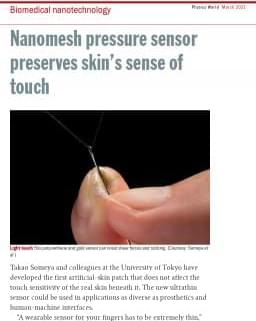Takao Someya and colleagues at the University of Tokyo have developed the first artificial-skin patch that does not affect the touch sensitivity of the real skin beneath it. The new ultrathin sensor could be used in applications as diverse as prosthetics and human-machine interfaces.
“A wearable sensor for your fingers has to be extremely thin,” explains Tokyo’s Sunghoon Lee. “But this obviously makes it very fragile and susceptible to damage from rubbing or repeated physical actions.” For this reason most e-skins developed to date been relatively thick and bulky.
In contrast, the sensor developed by the Tokyo team is thin and porous and consists of two layers (Science 370 966). The first layer is an insulating mesh-like network comprising polyurethane fibres around 200–400 nm thick. The second layer is a network of lines that makes up the functional electronic part of the device – a parallel-plate capacitor. This is made of gold on a supporting scaffold of polyvinyl alcohol (PVA), a water-soluble polymer often found in contact lenses. Once this layer has been fabricated, the PVA is washed away to leave only the gold support. The finished pressure sensor is around 13 μ m thick.
